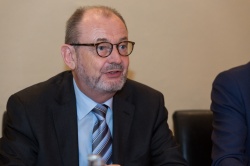Politics
England’s harsh slash at cancer drugs list
Around 25 treatments for seriously ill patients with specific cancers listed on England’s National Health Service’s Cancer Drug Fund are to be removed. This large change is likely to affect patients with cancers of the breast, bowel, prostate, blood, upper gastrointestine, brain and central nervous system, as well as gynaecological cases.
Report: Mark Nicholls


The planned removal of many cancer drugs from the Cancer Drug Fund (CDF) list means the NHS in England will no longer routinely fund these treatments.
They include Albumin Bound Paclitaxel for advanced pancreatic cancer, Bevacizumab for advanced breast cancer and for second or third line treatment of advanced colorectal cancer; Bosutinib for refractory chronic phase Chronic Myeloid Leukaemia; Cetuximab for third or fourth line treatment of metastatic colorectal cancer; Lenalidomide for second line treatment of multiple myeloma; Radium-223 Dichloride for prostate cancer; and Trastuzumab Emtansine for breast cancer.
UK-based cancer charities have expressed concern at the decision. Andrew Wilson, chief executive of the Rarer Cancers Foundation (RCF), said: ’We are concerned that these cuts are just the start of even more savage reductions in access to cancer treatment.’ The RCF wants a re-think on the decision by NHS England and believes there is still time for drug companies and the NHS to negotiate on the cost of the drugs.
All patients currently receiving the drugs will continue to do so, but from November no new patients will have access via the fund.
The CDF – made up of a panel of oncologists and other experts – was set up by the UK government in 2011 with a £200m budget to pay for drugs that had already been rejected as too expensive by National Institute of Health and Care Excellence (NICE) – the government’s drugs regulator.
While 72,000 patients have benefits, the cost has risen to £340m this year and is set to overspend by £70m in 2015/16, triggering the cuts. Among the drugs being cut is breast cancer treatment Kadcyla, which can extend life by an average six months – but costs a £90,000 per year for each patient. Some drugs will remain accessible via the fund, but only for particular cancers. Avastin, for example, will remain available for ovarian and some other cancers, but not for cervical, breast or bowel cancer.
Baroness Delyth Morgan, chief executive at Breast Cancer Now, said: ‘Kadcyla is a one-of-a-kind drug proven to extend life, but because the government, the NHS and the pharmaceutical industry have failed to agree realistic prices for new drugs, some women will die sooner.’ Samia al Qadhi, the chief executive of Breast Cancer Care, called the dropping of Kadcyla and Avastin, a ‘devastating decision’ while Eric Low, chief executive of Myeloma UK, said the British government had been ‘far too slow’ to address the critical flaws of CDF.
The Association of the British Pharmaceutical Industry said the cuts are ‘extremely disappointing’. Professor Peter Clark, oncologist and chair of the CDF, said it was the organisation’s duty to ensure ‘… we get maximum value from every penny available on behalf of patients’ while the NHS stressed that manufacturers still ‘… have the opportunity to drop the price they are asking the NHS to pay’, to enable drugs to be retained.
A National Health Service spokesman added: ‘We all recognise that the CDF has been successful by ensuring people with cancer in England have access to the same treatments as people across Europe.’
24.11.2015





